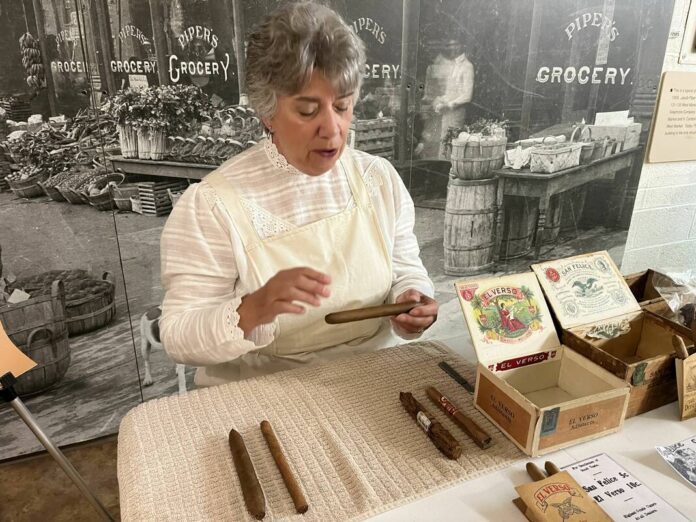
The new Deisel-Wemmer Company opened in 1900 in Lima, Ohio. German-born Henry Deisel was joined by fellow German immigrant brothers, Henry and William Wemmer. In 1900, 9.5 million cigars were produced at the factory and, by 1910, the number increased to 100 million. Women performed the task of cigar rolling at the factory. In 1929, the Gilbert CIgar Company merged with Deisel-Wemmer, forming the Deisel, Wemmer and Gilbert (DWG) Corporation.
LIMA — It was the beginning of a new century that later became known as “the Progressive Era.” The period of time between 1900 and 1910 resulted in business expansion and progressive reform throughout the United States. Many of the accomplishments from the early 20th century were depicted this past weekend at the Allen County Museum exhibit, “Life in America: 1900-1910.” The event was sponsored by The Eagles-Lima 370 Charity Foundation.
In the early 1900s, school children were using Roddy’s Elementary Geography and answering questions about the state of Ohio, including what waters are on its borders, what two rivers are in the state and identifying the state capital. In Cleveland, an educational commission was developed in response to the complaint of businessmen that, “the boys that you send to us can’t spell.” The Champion Spelling Book, by Warren Hicks (copyright 1909) depicts the methods that were used to address the issue and led to the Cleveland boys and girls winning the National Education Association spelling contest of 1908.
Throughout the country, families enjoyed ping pong and board games, many of which were purchased from the Sears catalog. Parcheesi, Jackstraws and checkers became increasingly popular. Crayola Crayons became available in 1903, making the era even more colorful.
Dr. Melvin Monroe was on hand at the museum, depicting a physician on Ellis Island, where over one million immigrants passed through in 1907. The immigrants were screened for diseases, including trachoma. Monroe displayed the use of a buttonhook to perform an eyelid examination such as those that were done on immigrants.
Closer to home, Henry Deisel, a German immigrant opened a cigar factory in Lima, Ohio. He was joined by fellow German immigrant brothers Henry and Willian Wemmer. The new Deisel-Wemmer factory opened in 1900. By 1910, the factory was producing 100 million cigars annually, with the most popular varieties being the San Felice and the El Verso. They sold for five and ten cents respectively. Cigar rollers were recruited with ads promising up to $12 per week.
Music, including ragtime, was popular during the early 1900s. Warren Bowery, a singer and guitarist was on hand at the museum to sing, “Shine on Harvest Moon” and other popular songs from the era.
Carter Phillips, a young history enthusiast was delighted to meet “Rough Rider Teddy Roosevelt” at the Allen County Museum this weekend. The Rough Riders was a name given to the 1st United States Volunteer Cavalry. The Rough Riders are best remembered for their conduct during the Battle of San Juan Hill, but “Teddy” also shared the story of how someone in his party shot a bear on a hunting trip. The bear was found to be a mother with a young cub. When Teddy captured the cub and turned it over to a local zoo, the press turned the incident into a hero story and soon a children’s toy called “Teddy’s Bear” was created.
Many of the foods we still enjoy today were first produced during the “Progressive Era.” Kellogg’s Corn Flakes, Quaker Oats, Hershey’s Cocoa and Maxwell House Coffee are among those foods and beverages we still enjoy today.
From the Model T car to the first electric washing machine to the first movie theater, called a “Nickelodeon,” the early 20th century truly was a progressive era, the effects of which are still felt today.






